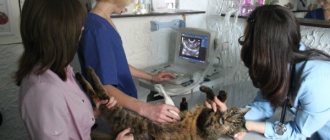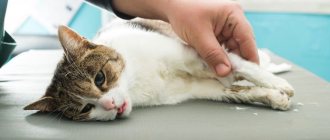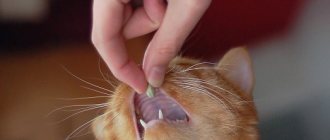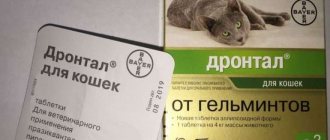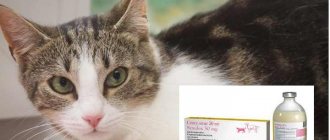7708Pavel
2
Owners of furry meowing pets may encounter any deviations or disturbances in the health of their pets. This deviation can be loose stools in cats, or, more simply, diarrhea. Can cats take Loperamide? – a question that arises among owners who urgently want to help their pet, but do not have suitable medications for animals in their veterinary medicine cabinet.
Diarrhea in cats can occur due to poisoning, poor diet, infection, parasites, allergies or gastrointestinal diseases. As a result of prolonged diarrhea, the cat becomes dehydrated, which threatens to impair blood circulation in the brain. For this reason, the alarming and dangerous symptom should be immediately eliminated, and Loperamide can help with this.
© shutterstock
Composition and properties
The drug Loperamidum consists of the active component - loperamide hydrochloride and such auxiliary ingredients as:
- talc;
- starch;
- food emulsifier E572;
- Aerosil;
- milk sugar.
The substances in the medicine have a depressing effect on peristalsis, namely, they slow down the movement of intestinal contents, retain feces and reduce the frequency of the urge to defecate. Loperamide begins to act within 60 minutes after the dose is taken. The maximum concentration in the blood is observed after 4 hours. The medication leaves the body with bile and feces.
Although Loperamidum is intended to treat humans, it is also often used in veterinary medicine when cats experience diarrhea due to gastrointestinal problems or other causes.
You can resort to taking the drug if the animal defecates very often.
But a cat can be given Loperamide only as a last resort, when the diarrhea is so severe that it can lead to dehydration, and other medications are powerless.
You should not treat diarrhea in a cat with this medication if stool problems are related to diet or allergic intolerance to any product. In this case, it is enough to put the purr on a special diet and eliminate the allergen.
Loperamide for diarrhea in cats
Owners of furry meowing pets may encounter any deviations or disturbances in the health of their pets.
This deviation can be loose stools in cats, or, more simply, diarrhea. Can cats take Loperamide? – a question that arises among owners who urgently want to help their pet, but do not have suitable medications for animals in their veterinary medicine cabinet. Diarrhea in cats can occur due to poisoning, poor diet, infection, parasites, allergies or gastrointestinal diseases. As a result of prolonged diarrhea, the cat becomes dehydrated, which threatens to impair blood circulation in the brain. For this reason, the alarming and dangerous symptom should be immediately eliminated, and Loperamide can help with this.
Action of Loperamide
Diarrhea in cats is a fairly rare occurrence, but can occur with certain disorders in the gastrointestinal tract.
In veterinary medicine, there are not many drugs for this disease, and therefore sometimes veterinarians are forced to use medications intended for humans to treat animals. Loperamide is a human drug used for digestive disorders and diarrhea .
Its action is to suppress intestinal receptors that are responsible for peristalsis: the contraction activity of the intestine decreases and its walls relax.
Loperamide should be given to cats only in extreme cases, when progressive diarrhea threatens dehydration, and other remedies do not help.
It should also be remembered that in case of poisoning, Loperamide does not fight toxins, but inhibits their release through feces.
This means that treatment for diarrhea in cats must be comprehensive and aimed not only at suppressing the symptoms, but also at their cause. Loperamide is an available analogue of Immodium.
Composition of the drug:
Loperamide for a cat with diarrhea may not be needed if the cause of diarrhea is not related to poor diet or allergic intolerance to any product. In such cases, treatment consists of a special diet and elimination of allergic foods.
But if a cat’s loose stool is associated with poisoning, a disease of the digestive system or a parasitic infection, then complex treatment of the animal will be required under the supervision of a specialist, using Smecta, which is an excellent absorbent agent.
Indications
Loperamide is a drug aimed at eliminating diarrhea, used for cats when there is a threat of dehydration.
Indications for the use of Loperamide in cats:
- Diarrhea due to dysbacteriosis;
- Allergic diarrhea;
- Viral and bacterial infections;
- A sudden change in diet.
Contraindications and side effects
This drug is not advisable for the treatment of diarrhea in cats if the true cause of the diarrhea is unknown. Loperamide should be given to a cat for diarrhea only after making sure that the animal is not at risk of intoxication or there are no other contraindications. Loperamide should also not be given to kittens under 3 months of age.
Contraindications:
- Allergic reactions to the components of the drug;
- Poisoning with poisons of inorganic origin;
- Stomach ache;
- Intestinal ulcer;
- Intestinal obstruction;
- Pregnancy and lactation in cats;
- Acute poisoning and allergies;
- Dysentery;
- Glaucoma;
- Kidney failure;
- Intestinal flatulence;
- Constipation;
- Diverticulosis.
Loperamide should be given to a cat very carefully together with other medications, due to possible adverse reactions. Taking Loperamide can enhance and inhibit the effect of some other drugs, which will jeopardize the health of the animal. For this reason, it is recommended to refrain from combining this drug with monoamine oxidase inhibitors, antihistamines or tranquilizers to avoid problems.
Side effects after administration may occur if the dosage of Loperamide for a cat for diarrhea has been exceeded. Also often at risk are kittens up to one year old, for whom it is difficult to calculate the optimal dosage.
Possible side effects in cats:
- Constipation;
- Flatulence;
- Inflammation in the intestines;
- Pancreatitis;
- Intestinal blockage and obstruction;
- Changes in heart rate and breathing;
- Lack of appetite;
- Depressed state.
How to give
In order for the treatment of diarrhea in cats to be effective and not cause harm, a clear dose must be established. Loperamide should be given to a cat at the rate of 0.05 - 1 mg per kilogram of animal weight.
It is worth considering that 0.1 mg per kilogram of weight is recommended for one-year-old kittens due to accelerated metabolism, and 0.05 mg per kilogram of weight for adult pets. Loperamide comes in the form of tablets, capsules and pastes, and regardless of the form of release, it is given orally.
This drug should be given to your pet only as prescribed by a doctor, carefully calculating the required dosage. Treatment should not exceed two days unless the animal is under the supervision of a veterinarian.
When do you need veterinary help?
Every owner should know: diarrhea in cats is a very dangerous symptom if it is not associated with errors in the pet’s diet. During diarrhea, water reserves are lost from the animal's body, which can lead to dehydration. If the owner encounters this symptom in a pet for the first time, then you should not delay providing help or self-medicate.
The health and even the life of the animal may be at stake, because loose stools can be caused by serious pathologies in the gastrointestinal tract, infection or severe poisoning. In any case, it would be wise to take your pet to the clinic and see a veterinarian.
The doctor will conduct an examination, take the necessary tests, identify the cause of diarrhea and prescribe effective treatment. It is important to remember that giving Loperamide to a cat for more than two days is dangerous; it is also worth taking into account the animal’s age and individual characteristics.
source
How to give Loperamide to a cat with intestinal upset?
Owners of furry meowing pets may encounter any deviations or disturbances in the health of their pets. This deviation can be loose stools in cats, or, more simply, diarrhea.
Can cats take Loperamide? – a question that arises among owners who urgently want to help their pet, but do not have suitable medications for animals in their veterinary medicine cabinet.
Diarrhea in cats can occur due to poisoning, poor diet, infection, parasites, allergies or gastrointestinal diseases. As a result of prolonged diarrhea, the cat becomes dehydrated, which threatens to impair blood circulation in the brain. For this reason, the alarming and dangerous symptom should be immediately eliminated, and Loperamide can help with this.
Loperamide for cats - indications and dosage
Owners of furry meowing pets may encounter any deviations or disturbances in the health of their pets. This deviation can be loose stools in cats, or, more simply, diarrhea.
Can cats take Loperamide? – a question that arises among owners who urgently want to help their pet, but do not have suitable medications for animals in their veterinary medicine cabinet. Diarrhea in cats can occur due to poisoning, poor diet, infection, parasites, allergies or gastrointestinal diseases.
As a result of prolonged diarrhea, the cat becomes dehydrated, which threatens to impair blood circulation in the brain. For this reason, the alarming and dangerous symptom should be immediately eliminated, and Loperamide can help with this.
What to feed a cat with diarrhea?
List of medicines for diarrhea
Before introducing you to the list of medications to combat diarrhea, I would like to clarify that in order for the medicine to have an effective effect on the mucous membranes of the gastrointestinal tract, they must be completely cleared of food. In order to achieve a similar effect, it will be enough to remove all food by approximately one knock. During this time, you will have to give your pet only water.
If he refuses to drink it, then you will have to force him to drink. You can give your cat something to drink using an ordinary medical syringe.
All you have to do is draw water into a syringe, pick up your pet, fix its head and inject water into the oral cavity in small portions.
If you want water to be beneficial for the stomach and intestines, then dissolve a packet of rehydron in it.
List of medications for diarrhea:
- Enrofloxacin. Will help cope with bacterial infection. Can be given to the animal orally or administered intramuscularly
- Gentamicin. Attributed to the animal if diarrhea has led to the development of sepsis. It is better to administer the drug intramuscularly
- Tylosin. This remedy is ideal for the treatment of infectious diseases. It can only be administered intramuscularly
- Glucose. Needed to restore water balance and normalize the functioning of the cardiovascular system
- Activated carbon. An absorbent that effectively removes toxins from the body
- Enterosan. Normalizes digestion
- Ainil. This medicine will help you reduce body temperature to normal levels, and also relieve the animal from spasms.
- Lactobacterin. Help restore the microflora of the stomach and intestines
- Azinox. An antiparasitic agent that will help you get rid of helminths
Diarrhea medications for pregnant cats
Diarrhea in a cat during pregnancy can cause quite serious consequences.
If you fail to restore proper functioning of the gastrointestinal tract in the shortest possible time, this can lead to spontaneous abortion.
In view of this, if you see that your pet’s condition does not return to normal after 3 days, then you should definitely see a veterinarian.
But even during these three days you should be as attentive as possible to your pet. If the diarrhea is very severe, then dehydration will begin earlier and, as a result, she may go into premature labor. For this reason, it will be better if during the day you periodically check whether too much fluid has left the body. To understand this, it will be enough to touch the cat’s gums.
If they are completely dry, then it’s time to immediately run to the clinic. And remember that only a veterinarian can prescribe antibiotics in this case. Therefore, if you decide to treat your pet at home, then give him only safe medications and clean water. It could be Activated Carbon or Enterozoo.
Diarrhea medications for pregnant cats:
- Probifor (will help restore microflora)
- Nifuroxazide (antibacterial agent)
- Stop cystitis (will restore the functioning of the kidneys and urinary system)
- Drontal (an effective dewormer)
Foods that can be given to porridge during diarrhea
I would like to say right away that feeding a cat with diarrhea milk, kefir and cottage cheese, even low-fat, is strictly prohibited. While diarrhea is in the acute phase, they will further overload the stomach and this will aggravate the problem even more. It is also best for you to avoid dry food during treatment.
Since it has the ability to swell in the stomach, taking away moisture, this can accelerate the process of dehydration, which will lead to vomiting and fever. In addition, remember that throughout this period the sick animal should eat food in small portions. Even if your pet constantly asks to eat, do not make concessions to him and feed him no more than once every 2 hours.
Source: https://tepcontrol.ru/loperamid-pri-diarei-u-koshek/
When is it used?
It is necessary to give a cat Loperamide for diarrhea only if the symptom threatens the pet with dehydration of the body, as a result of which blood circulation in the brain is disrupted. Therefore, veterinarians usually prescribe medicine for cats for prolonged dangerous diarrhea caused by dysbacteriosis or resulting from a sudden change in diet. Veterinarians also prescribe Loperamide for stool problems caused by bacterial and viral infections, as well as various diseases of the gastrointestinal tract.
Is it possible to give a cat loperamide for diarrhea: review, instructions
No cat owner is immune from the fact that their pet may get sick; most often cats suffer from digestive tract disorders. When an animal has loose stools, the owner wants to help with some medicine from his own first aid kit. A common question that the veterinarian is asked is whether Loperamide can be given to a cat for diarrhea.
Composition and release form
Loperamide is in every person's medicine cabinet, because this drug is used if a person has a gastrointestinal tract disorder in the form of diarrhea.
Loperamide is one of the few drugs that can also be used on animals.
Its action is to suppress intestinal receptors responsible for peristalsis, which means that the frequency of contractions decreases and the walls are in a relaxed state.
View this post on Instagram
And today, finally, about why the previous two posts were written. Thank you for ❤ ⠀⠀⠀⠀⠀ Loperamide (Imodium) is a medicine for the SYMPTOMATIC treatment of diarrhea (under the tag #infodoc_treatment there is a post about types of treatment; I recommend it if you haven’t read it yet).
Advertising assures us that the drug can cope with any diarrhea, regardless of its cause, but in reality not everything is so rosy. ⠀⠀⠀⠀⠀ The fact is that the mechanism of action of this medicine is based on suppressing intestinal motility and increasing the tone of the anal sphincter, which can play a cruel joke in any infectious diarrhea.
The diarrhea actually stops, but its cause, the pathogen, as well as all its waste products, remain in the intestinal lumen and continue to exert their destructive local, and when they enter the bloodstream, systemic effect. This is fraught with deterioration of the condition up to the development of infectious-toxic shock.
⠀⠀⠀⠀⠀ This is why Loperamide cannot be used: ▪for diarrhea accompanied by symptoms of intoxication (fever, headache, weakness, pain in muscles, joints) ▪if there is blood in the stool, because may aggravate the course of colitis caused by clostridia, Shigella, Escherichia and other enteroinvasive bacteria.
⠀⠀⠀⠀⠀ In addition, there are studies indicating an increased risk of developing carrier status after an intestinal infection in patients taking Loperamide.
⠀⠀⠀⠀⠀ And when is it possible? In case of urgent need to relieve symptoms in: ▫irritable bowel syndrome ▫mild exacerbation of ulcerative colitis (recently there was a post by @golovenkoalexey) ▫diarrhea in cancer patients during chemotherapy ▫other types of diarrhea of non-infectious origin ▫travelers' diarrhea (with caution) ⠀⠀⠀⠀⠀ Important! The drug is contraindicated in children under 6 (in foreign recommendations - up to 2) years. An overdose is fraught with depression of the central nervous system, disturbances in the functioning of the heart and can be fatal. Please do not self-medicate! This is dangerous for your health and sometimes even your life! ⠀⠀⠀⠀⠀ #infodoc_first aid kit
A post shared by Daria Panieva, infectious disease specialist (@_infodoc_) on Oct 11, 2021 at 1:07am PDT
Loperamide for cats with diarrhea is given only in emergency cases, if such a condition can cause dehydration in the body or other methods do not bring the desired effect. The point in using the drug that needs to be taken into account is that this drug does not fight the causes of poisoning, but only stops the flow of loose stool. Treatment must be comprehensive.
Loperamide contains the active substance loperamide hydrochloride. Additional components of the drug are:
- starch;
- talc;
- lactose;
- magnesium stearate;
- aerosil.
The drug is available in tablet, capsule and gel form.
Indications for use
It is not recommended to give loperamide to a cat for diarrhea, but in extreme cases it can be given. When there is no other alternative drug, this drug can be used to treat loose stools in an animal. There are a number of situations in which first aid medicine can be used:
- When diagnosing a cat with spastic colitis or irritable bowel syndrome. If your pet has this disease, caused by a dysfunction of the nervous system, then intestinal upset may occur. This occurs due to persistent spasms of the muscles of the intestinal walls, which in turn leads to an inflammatory process of the mucous membrane. You cannot give a kitten Loperamide.
- Loose stools as a result of severe stress. If your pet lives in an apartment and does not go for walks, psycho-emotional stress may occur. This condition is caused by the fact that the pet does not perform the functions inherent at the genetic level. For example, instead of getting food themselves, the owner brings food on demand and in sufficient quantities. The pet's basic needs are suppressed.
- Wrong diet. Changing a cat's diet or drinking milk can cause diarrhea. If diarrhea is caused by this phenomenon, then it is worth giving the drug Loperamide and putting the pet on a starvation diet for a day.
Directions for use and doses
The dosage of the drug is calculated from the following recommendations: a tablet in a dosage of 0.05-0.1 mg for every 400 g of the pet’s weight. The maximum time of use of the drug is 48 hours. If taking the medicine does not cause improvement, then you should contact your veterinarian. The required dosage of Loperamide should only be given orally.
There are cases when the use of the drug may be hampered by specific behavioral signs of the cat. Under no circumstances should you give medication if:
- the pet is weakened;
- poisoning has occurred with toxic substances;
- a painful attack is observed;
- the cat bears offspring or feeds kittens;
- kittens up to one year old;
- the presence of an infectious disease in the animal;
- for kidney pathology, etc.
You should never experiment and combine several drugs yourself.
Possible side effects
If the owner decides to give the cat Loperamide, then you need to know that there may be side effects from using the drug. Side effects of Loperamide include:
- constipation;
- bloating;
- inflammatory process in the intestines.
Also, taking the drug for diarrhea can provoke the development of pancreatitis or intestinal obstruction. Refusal to eat can be a side effect of the drug, as can a depressed pet.
The occurrence of a side effect may indicate an incorrect calculation of the dosage of Loperamide and, as a result, an overdose. Kittens are also at risk, because if they have loose stools, the owners often decide to give Loperamide after all, but cannot calculate the exact dosage.
Contraindications to the use of the drug are:
- allergic reaction of the cat to one of the components of the product;
- if the pet has been poisoned by toxic substances;
- intestinal ulcer;
- intestinal obstruction;
- period of gestation and feeding;
- diverticulosis.
It is also strongly recommended not to give the drug to cats in old age, or the medication should be taken in a dosage reduced by 2 times. This is explained by the fact that towards the end of life the animal’s body is weakened, and the metabolic process operates at a slower rate.
Source: https://kotofan.ru/mozhno-li-dat-kotu-loperamid-ot-ponosa/
How to give it to a cat?
The drug must be given to the animal, taking into account its weight.
Loperamide for animals should be prescribed by a veterinarian, who will select the dosage and limit the duration of the treatment course depending on the condition of the purr, its weight and the accompanying diagnosis of diarrhea. Usually the daily dose is calculated as follows: per 1 kg of weight 0.05-1 mg of medication. The duration of the treatment course is no more than 2 days, but if the cat is under the supervision of a veterinarian, the duration of therapy can be increased until the act of defecation is completely normalized.
Is it possible to give a cat “Loperamide” for diarrhea: dosage, how to treat correctly
7225Pavel
2
Owners of furry meowing pets may encounter any deviations or disturbances in the health of their pets. This deviation can be loose stools in cats, or, more simply, diarrhea. Can cats take Loperamide? – a question that arises among owners who urgently want to help their pet, but do not have suitable medications for animals in their veterinary medicine cabinet.
Diarrhea in cats can occur due to poisoning, poor diet, infection, parasites, allergies or gastrointestinal diseases. As a result of prolonged diarrhea, the cat becomes dehydrated, which threatens to impair blood circulation in the brain. For this reason, the alarming and dangerous symptom should be immediately eliminated, and Loperamide can help with this.
© shutterstock
What is Loperamide?
Loperamide is a drug for the symptomatic treatment of diarrhea. However, this is the abbreviated name for the substance loperamide hydrochloride, which is on the Model List of Essential Medicines compiled by the World Health Organization.
Did you know? « Loperamide
» developed in 1969 by employees of Janssen Pharmaceuticals.
This is an active substance that leads to the desired result in the treatment of diarrhea. The element is found in various drugs that are considered analogues and have an antidiarrheal effect.
Chemical composition and characteristics of the drug
The composition of the drug "Loperamide":
- loperamide hydrochloride (2 mg based on 100% substance);
- lactose monohydrate;
- potato starch;
- calcium stearate.
The active substance, loperamide hydrochloride, impairs intestinal motility.
At the same time, it increases the transit time of intestinal contents through the digestive tract and improves the ability of the intestinal walls to absorb moisture.
The anal sphincter comes into a state of tone, delaying fecal incontinence. Thus, Loperamide provides symptomatic treatment and helps control the urge to defecate.
Effect of the drug
The drug reacts with intestinal receptor proteins that are responsible for suppressing peristalsis. As a result, the production of prostaglandins and acetylcholine is stimulated; it is they who reduce the activity of the intestine, relaxing its wall , but without affecting the production of enzymes.
Please note that the drug does not eliminate the effect of toxins, but only slows down their evacuation.
Therefore, in many cases, taking Loperamide is undesirable, since diarrhea is a protective mechanism. For example, in case of food poisoning, artificially slowing down motility will cause toxins to take longer to act on the intestinal wall.
Is it possible to give a cat Loperamide for diarrhea?
Loperamide is intended primarily for people. However, in some cases the drug can be given to animals, including cats. It is important to remember that diarrhea is not a disease, but a symptom.
Initially, you need to cure the cause of its appearance. Diarrhea is often caused by poor diet. To alleviate the cat's condition, the use of medication is allowed.
However, this should not be the only treatment.
First of all, enterosorbent and temporary refusal of food will get rid of the disease. In cases where diarrhea does not stop for a long time and is combined with vomiting, the presence of an infectious pathogen in the microflora is possible. However, it is impossible to make a diagnosis on your own; the cat must be shown to a veterinarian.
Important! If there are black impurities and blood in the cat's feces, it is prohibited to give Loperamide. Such symptoms indicate internal bleeding, the animal should be immediately shown to a veterinarian.
In case of diarrhea, it is quite difficult to bring the animal to the clinic due to involuntary defecation. It is in this case that it is permissible to give the cat medication. Loperamide may be prescribed by a veterinarian during treatment. This is a symptomatic auxiliary therapy that can alleviate the animal’s condition.
Limitations and possible side symptoms
Kittens and older cats cannot be treated for diarrhea with Loperamide unless the true cause of frequent loose stools has been established. In addition, antidiarrheal medication is contraindicated in the following cases:
- allergic reaction to the components of the medication;
- kitten age up to 3 months;
- painful discomfort in the abdomen;
- poisoning with toxic substances of inorganic origin;
- ulcerative intestinal lesions;
- intestinal obstruction;
- pregnancy and lactation period;
- dysentery;
- increased intraocular pressure;
- impaired kidney activity;
- protrusion of the intestinal walls;
- constipation.
The drug should not be taken simultaneously with any antihistamines.
Particular caution should be taken when giving Loperamidum to your purr if other medications are taken at the same time, since the chance of developing side effects increases. For example, medicine for diarrhea can inhibit the action of other medications, which is extremely dangerous for the pet’s health. Therefore, it is better not to combine Loperamide with tranquilizers or antihistamines.
If the dosage is calculated correctly, the drug is well tolerated and does not provoke negative effects; an overdose is also unlikely. Otherwise, if your cat takes Loperamide, the following side effects will occur:
- inflammation of the pancreas, intestines;
- constipation;
- increased gas formation in the intestines and bloating;
- loss of appetite;
- depressed state, drowsiness;
- jumps in heart rate and breathing;
- dry mouth;
- abdominal cramps;
- obstruction and intestinal blockage.
If you observe a deterioration in your cat’s health and undesirable effects, you should immediately stop treatment and show your pet to a veterinarian.
The benefits and harms of the drug
The benefit of the drug is manifested in the deterioration of intestinal motility. Fecal masses no longer come out spontaneously. Thus, the animal’s condition improves, which allows the basic treatment to be carried out effectively.
Harmful effects are possible in the following cases:
- overdose;
- self-prescription without consulting a veterinarian;
- lack of primary treatment.
If the cause (poisoning, bleeding or infection) is not treated, the animal’s condition will worsen. In case of overdose, side effects may occur.
Overdose
Drowsiness in a fluffy is a symptom of a drug overdose.
The following symptoms indicate that a cat is receiving Loperamide in an increased dosage:
- drowsiness;
- lack of coordination;
- lethargy;
- excessive muscle tension;
- respiratory depression;
- disruption of the passage of intestinal contents through the gastrointestinal tract.
Usage and dosage
The estimated dosage is 0.05-0.1 milligrams per kilogram of weight. For one-year-old kittens take 0.1 mg/kg, for adult animals - 0.05 mg/kg, this is done due to the higher metabolism of small pets. The drug is administered orally regardless of feeding (with a small amount of food possible).
It is not recommended to use Loperamide at home for more than 2 days, as this can lead to unpleasant consequences. Loperamide should not be given to kittens under 2-3 months of age, as their body will react excessively. Use with caution in six-month-old animals.


